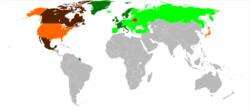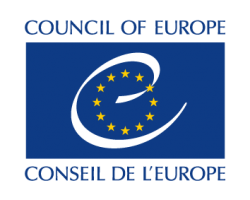Council of Europe
(IGO) | |
|---|---|
 Ten founding members Joined subsequently Official candidates Observer at the Parliamentary Assembly Observer at the Committee of Ministers Observer at the Committee of Ministers and the Parliamentary Assembly | |
 | |
| Abbreviation | CoE |
| Formation | 5 May 1949 |
| Headquarters | Strasbourg, |
| Type | international legal |
| Subgroups | • • European Pharmacopoeia Commission |
| Member of | European Policy Centre |
| Sponsor of | Institute for Strategic Dialogue |
| Sponsored by | American Committee on United Europe |
| Membership |
|
| IGO. Cannot make laws, but makes treaties. Accused of institutional (revolving door) corruption. Appears to bribe European & transcontinental countries. | |
Not to be confused with the European Council or the Council of the European Union, the Council of Europe is an international organisation independent of the European Union. It was founded in 1949 and currently has over 45 member states.
Contents
Other Details
In 2011, Kevin Galalae carried out a 30-day hunger strike in a bid to secure a declaration that the operation of the covert SAC surveillance and censorship program system in UK universities is contrary to the European Convention on Human Rights. The European Commissioner for Human Rights, Mr T Hammarberg, was unmoved.
This is the parent body of the European Court of Human Rights. In April 2014, Edward Snowden told the Council of Europe that "The NSA has specifically targeted either leaders or staff members in a number of civil and non-governmental organisations... including domestically within the borders of the United States."[1]
Related Quotation
| Page | Quote | Author | Date |
|---|---|---|---|
| Black site | “The European Parliament denounces the lack of co-operation of many member states and of the Council of the European Union with the investigation; Regrets that European countries have been relinquishing control over their airspace and airports by turning a blind eye or admitting flights operated by the CIA which, on some occasions, were being used for illegal transportation of detainees; Calls for the closure of [the US military detention mission in] Guantanamo and for European countries immediately to seek the return of their citizens and residents who are being held illegally by the US authorities; Considers that all European countries should initiate independent investigations into all stopovers by civilian aircraft [hired by] the CIA; Urges that a ban or system of inspections be introduced for all CIA-operated aircraft known to have been involved in extraordinary rendition” | European Parliament | 2006 |
Sponsor
| Event | Description |
|---|---|
| American Committee on United Europe | CIA front organization. Proves European unity movement was a heavily US-driven project. |
Related Document
| Title | Type | Publication date | Author(s) | Description |
|---|---|---|---|---|
| Document:Council of Europe sides with Julian Assange | Article | Sara Chessa | The attitude of European institutions is changing after years of silence which seemed to authorise or support the US and the United Kingdom’s behaviour in relation to an individual who is apparently deprived of the right to prepare his defence and deprived as well of his right to dignified psychophysical conditions. Now, the Council of Europe has decided to speak up on behalf of Julian Assange. |
Documents sourced from Council of Europe